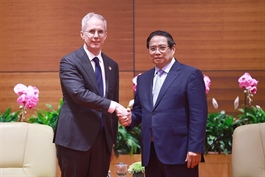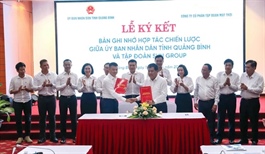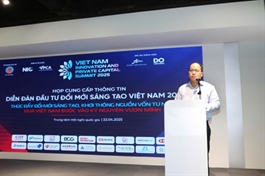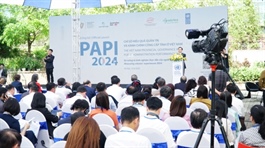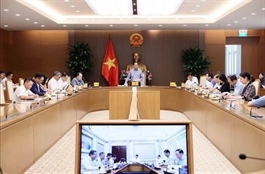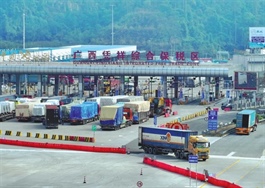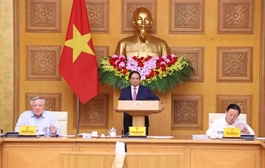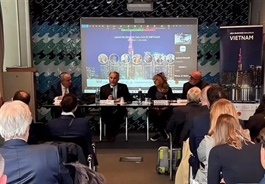People must come first to achieve development goals: P4G
People must come first to achieve development goals: P4G
Leaders and representatives from around the world issued a clear and unified message: sustainable development must put people first and embrace technology as a force for inclusive transformation.
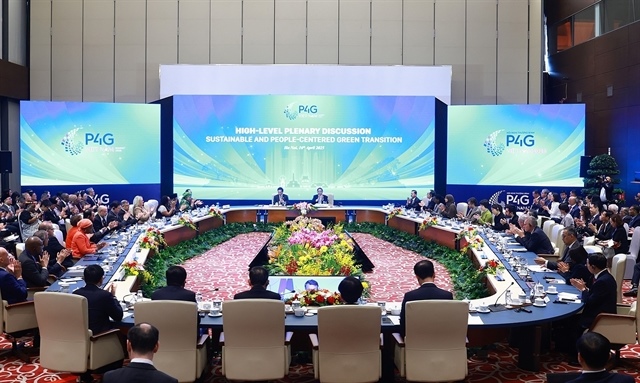
Delegates at the high-level discussion session on 'Sustainable and People-centred Green Transition' on Wednesday afternoon. — VNA/VNS Photo |
As the need for climate emergency escalates and environmental challenges deepen, leaders and representatives from more than 40 countries gathered at the P4G Vietnam Summit held in Hà Nội on Wednesday to discuss solutions for a sustainable future while putting people at its core.
At the high-level talks chaired by Prime Minister Phạm Minh Chính, the United Arab Emirates (UAE), a long-standing regional leader in clean energy, used the P4G platform to reinforce its commitment to a people-first green transition.
“People are and must always remain at the heart of our development plans, globally, regionally and nationally,” said the UAE representative.
This principle is being actioned through the UAE’s Net Zero Strategy 2050, which is positioned not just as an environmental blueprint but as a stimulus for economic and social advancement.
The UAE is investing heavily in clean transport and a circular economy, prioritising sectors like sustainable infrastructure, food systems and transportation.
At the technological frontier, the UAE is integrating AI and blockchain into renewable energy optimisation and smart agriculture.
“AI offers us abundant opportunities, abundant practical solutions for many of the challenges posed by climate change,” the representative added.
These innovations will be spotlighted at the Emirates Agriculture Conference and Exhibition next month, which will feature smart irrigation and agri-tech for sustainable food production.
Meanwhile, Japan echoed the urgency of immediate and collective climate action. With a focus on implementation, the representative of Japan introduced Japan’s updated Nationally Determined Contributions (NDCs), including a 60 per cent emissions reduction by 2035 and 73 per cent by 2040.
Japan’s approach rests on aligning environmental goals with stable energy supplies and economic growth.
“We will promote the simultaneous realisation of decarbonisation, stable energy supply and economic growth,” said the representative, adding that Japan’s Joint Crediting Mechanism (JCM), operational in 29 countries, exemplifies technology-driven cooperation.
What sets Japan apart is its belief in the synergy between global collaboration and local innovation.
“The synchronised data of P4G is a great opportunity to learn technologies and strengthen our collaboration,” he said while encouraging all participants to engage deeply in technology exchange.
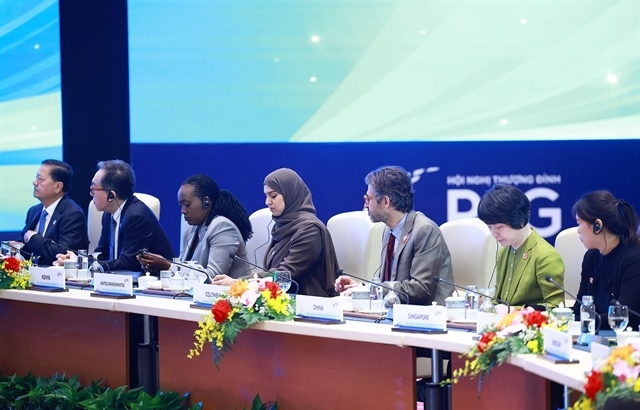
Delegates at the high-level discussion session on 'Sustainable and People-centred Green Transition' on Wednesday afternoon. — VNA/VNS Photo |
China’s delegate shared President Xi Jinping’s philosophy of ecological civilisation.
The country has demonstrated significant results. Since 2012, carbon emissions per unit of GDP have fallen by over 35 per cent, and by 2024 new energy vehicles exceeded 12.8 million units in sales.
“Green productivity has become a driving force for China’s economic growth,” the representative said, adding that ecological red lines now protect 30 per cent of China’s land and more than 300 endangered plant species have been reintroduced to the wild.
Crucially, China is advancing green technology integration, focusing on transforming traditional industries like steel and petrochemicals through innovation. The goal is to build "a green manufacturing system and service system", backed by robust green finance mechanisms and carbon markets.
China is also calling for a more equitable global approach to sustainability, criticising protectionist policies like carbon border adjustments.
"These increase the costs of global energy transition," the representative warned, reaffirming China's commitment to multilateral cooperation through initiatives like the green Belt and Road.
Green transitions
Singapore offered a pragmatic framework for a people-centred green transition, warning that the economic and social benefits of transition must be equitably shared and not unfairly borne by vulnerable populations.
To achieve this, Singapore focuses on three pillars: mitigating the social costs of climate action, workforce transformation and participatory policymaking, where communities and stakeholders shape transition plans.
"We must ensure that people’s lives are improved in the process," the Singapore representative concluded, reinforcing that sustainability is not just about the planet but also about prosperity, fairness and inclusion.
As a founding P4G partner country, Denmark highlighted Việt Nam’s role in P4G as a key market for the international business community.
“Today's geopolitical reality sheds a new light on multilateral cooperation. By now, we know that business as usual is not enough. We need innovative solutions,” said the representative of Denmark.
“And P4G has proven that when we build strong partnerships between the public, private and civil sectors, we deliver on the green transition,” she said, adding that with P4G, public funds have mobilised considerable private investments.
“We believe looking at blended capital for partnerships is the right way to go. This enables P4G to directly intensify climate entrepreneurship across our economies. We look forward to following the exciting next steps of P4G's journey. And in this room, we share a commitment to mobilise investment for climate and to work together in multilateral cooperation.”
Concluding the meeting, PM Chính underscored the need for multilateral cooperation to address global threats, including climate change, pandemics, and environmental degradation.
“No single country can resolve these issues alone,” he said.
“The transition to a green and sustainable economy is inevitable. It cannot be delayed.”
The PM also laid out four foundational pillars of Việt Nam’s development vision: resources, motivation, strength and innovation, with people at the centre of it all.
“People are both the goal and the driving force of development. They are our most valuable resource,” he said.
“We pursue growth without sacrificing social progress or environmental sustainability. No one should be left behind.”
- 19:47 16/04/2025







